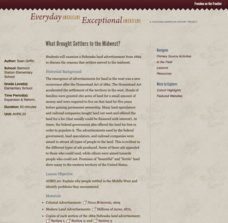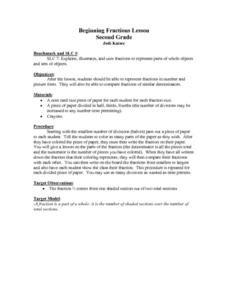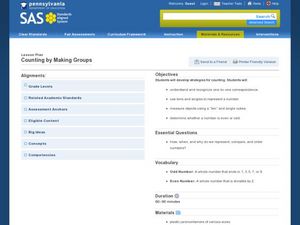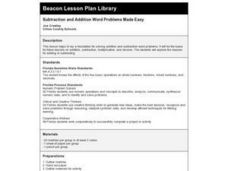Roy Rosenzweig Center for History and New Media
What Brought Settlers to the Midwest?
Drawn by promises of fertile land, thousands of settlers poured West because of the Homestead Act of 1862. By examining images of the ads that drew them westward, learners consider the motivations for movement. They also consider how the...
Curated OER
Fraction Action
Students create fractions using strips of paper and then compare the fractions.
Curated OER
Moral and Ethical Beliefs: Proverbs
Students compare and contrast the cultures of Japan and the United States. In groups, they are given a proverb from each country and note the similiarties in their teachings. They complete a worksheet and share their findings with the...
Curated OER
Place Value
Second graders use physical models to represent and demonstrate place value concepts by using base-ten blocks and hundreds charts. They compare numbers to see which number is smaller or larger and put numbers in order from smallest to...
Curated OER
Party, Party, Party
Second graders conduct investigations with counting, comparing, organizing, analyzing, displaying and interpreting data. They pose questions for investigation and collect the data. Students display the data in tally charts, uniform...
Curated OER
Beginning Fractions Lesson
Second graders practice representing fractions in number and picture form. They compare fractions with similiar denominators. They use a piece of paper to visualize the fraction.
Curated OER
Designing a CD Cover
Tenth graders design a CD cover and compare and contrast traditional and drawing methods with the use of AppleWorks and Photoshop software. They create a professional design layout using AppleWorks, and present their design in the form...
Curated OER
Where In the World Are We?
Fifth graders read postcards and find their locations on maps. They use the pictures and text on the postcards to write about imaginary vacations. They compute the mileage and compare it to TripMaker data.
Curated OER
Oral Language in Mathematics
Third graders examine fractions by descriptively writing about them. In this number sense lesson, 3rd graders read number sentences and compare fractions based on their size. Students explain fractions to a friend by writing a friendly...
Curated OER
Cuisenaire Fractions
Young scholars study fractions by comparing rations using Cuisenaire rods. They make predictions, measure lengths using Cuisenaire rods and explain their answers. Next, they discuss the relationship of the different rods in terms of...
Curated OER
"Julie of the Wolves"
Fifth graders research life in Alaska and compare life there to their lives in this lesson. They read "Julie of the Wolves." They research through the novel and other reference books facts about the Alaskan climate and geography. They...
Curated OER
Counting by Making Groups
First graders represent, compare, and order numbers. In this counting skills lesson, 1st graders use manipulatives to demonstrate one-to-one correspondence and to represent numbers. This lesson includes a teacher script to guide the lesson.
Curated OER
Adding and Subtracting Decimals
Students practice adding and subtracting numbers with decimals. In this decimals lesson plan, students use grid paper and money to learn how to add and subtract decimals.
Curated OER
Decimals Anyone?
Seventh graders compare and order decimals. Given a set of integers, they compare them using inequalities. In groups, 7th graders participate in hands-on decimal activities. Using string, paper clips and decimal cards, classmates...
Curated OER
Investigating the Probability
Students investigate probability using coins and dice. They collect data, graph, organize and interpret data. They predict, describe, compare, compute and draw conclusions based on what they observe and record.
Curated OER
Decimal Place Value
Fourth graders plug in numbers into a place value chart with decimals to the hundredths place. In this place value lesson plan, 4th graders fill in answers on the SmartBoard and a worksheet.
Curated OER
Approximating Measures
Fourth graders complete a worksheet about approximate measurements. In this activity on approximation, 4th graders compare the wingspan of a given bird to the wingspan of other birds and classroom objects.
Curated OER
Doing The School Run
Students explore finding the percent of a numbers. They survey their peers to determine modes of transportation used in getting to school. Afterward, students organize information and create graphs and charts. They explore alternative...
Curated OER
Money Circulation: A Story of Trade and Commerce
Students are introduced to the meaning, symbolism, and value of the quarter. They determine the percentage of total monetary value held in quarters and graph the results. Students infer about the U.S. Mint's distrubution of coins. They...
Curated OER
Introduction to Decimals
In this math worksheet, learners are introduced to decimals by first studying pattern blocks showing a number with tens, ones and tenths. Students locate decimals on number lines and rulers and shade decimal pictures. Learners compare...
Curated OER
Place Value Partners
Students practice place value. In this place value lesson plan, students partner up and place their numbers in the correct place value position. One student creates the number, while the other student receives the number. They switch...
Curated OER
Finding Sums to 6
Students explore the additive identity property where they add multiple numbers to get to the number 6. For this number 6 lesson plan, students also work on their addition charts.
Curated OER
Subtraction and Addition Word Problems Made Easy
Third graders create addition and subtraction word problems for a partner to solve using marbles. They explain whether the problem is an addition, subtraction, "take away", "have and need", compare or "what is the rest" type problem.
Curated OER
Sum of the Parts
Fifth graders build objects using various materials. They estimate the weight of the object using individual building pieces. Then they weigh the actual object and then tear it apart and weigh the pieces. They compare the two weights.























